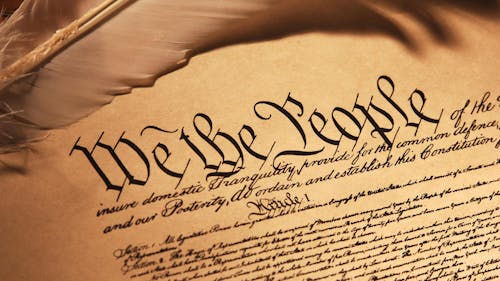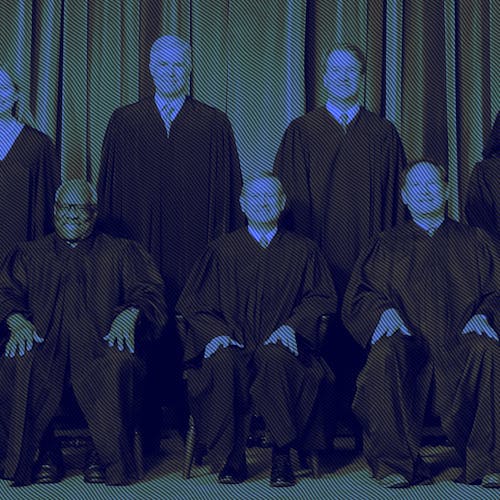BROWN: Constitutional framework is perfectly intact
Column: KB's Spoken Word

In a recent opinion piece in the Daily Targum, Sumit Bedi wrote about a perceived need for radical revisions to our American republic. In essence, the wartime presidency of former President Franklin D. Roosevelt is held as an example of the beneficial nature of increased presidential powers.
While I agree with the singular example of enhanced presidential power that Bedi presents, the power to combine and restructure existing federal bureaucracies to limit the wasteful overextension of our federal resources is summarily rejected by the self-reinforcing nature of the lifetime appointee system that is used to populate such organizations.
In fact, presidential efforts to “scatter into the winds” inefficient and backbiting bureaucracies have often led to the effective disintegration of presidential authority in the eyes of their subordinates, something for which this article fails to account.
Although such action to limit inefficiency has been presented as a logical choice for a chief executive, and with regard to the budgetary constraints of a nation being able to truly direct one’s executive branch would seem to make sense, extrinsic forces wrought by the separation of powers and the limits of presidential authority require Congressional support for any such re-imagination of the bureaucratic framework.
I would advise that government must be in a position to function without self-imposed roadblocks, as the practitioners of government could present a myriad of examples to supplement the claim that there are already enough hurdles in the process of lawmaking.
In the mentioned article, a less agreeable notion of the acceptable role of government is presented that I felt must be expounded upon and rejected. In essence, the American government exists as a collaborative union of quite disparate populations.
While many peoples of all different walks of life are classified and identified as Americans, it is the Constitution’s clearly expressed procedural structure alone that guides all future interactions between these groups of people.
In this document, certain rules are established to explain the acceptable functions of government. In addition, the Bill of Rights issues a direct explanation of the personal freedoms of each American citizen. While a simple civics class could teach this, recalling this information allows us to consider how such principles are at odds with the objective of government presented in Bedi’s article.
The American system of government has never sought to achieve immediate results to our collective issues, but it has created a forum for representatives of the entire population to negotiate on behalf of their constituencies and to ensure their own political survival while guaranteeing a set of rights.
If the functionality of the American government were to change even slightly, and that change had not been implemented through constitutional means, the political union itself would be forsaken and our collective identity would be shattered.
Despite the fact that “the world today is very different,” there is no logical nexus between that reality and the claim that our classical liberal ideals (majority rule, the deliberative process and pluralism) should be rejected and replaced.
In fact, no alternative to representative government has more ably distributed the amount of public goods that our welfare state is able to provide to the most needy among us.
If the goal of American governance were to change to one in which efficiency were of foremost concern, the response would have to completely reject any semblance of democratic participation, since transitions in government are inherently based upon the steadying of political institutions.
Such protections from that sort of autocratic form of government could only be obtained through the sometimes infuriatingly inefficient periods of time in which representatives learn how to pass bills that have a plausible chance of being signed into law by the president.
If the goal alone was efficiency, perhaps the only viable system would be to roll dice whenever a problem of governmental administration arose, with random courses of action assigned to each of the numbers on the die.
In this alternative institutional structure, the immediate resolution through means of chance would guarantee almost mechanical efficiency, albeit with disastrous results. While I will stick with the Constitution as my favored form of government, such a probabilistic form of decision-making would do much more to preserve the rights of the American people than would the massive expansion of presidential authority that Bedi supports.
Kieran Brown is a School of Arts and Sciences senior majoring in politics and history. His column, "KB's Spoken Word," runs on alternate Wednesdays.
*Columns, cartoons and letters do not necessarily reflect the views of the Targum Publishing Company or its staff.
YOUR VOICE | The Daily Targum welcomes submissions from all readers. Due to space limitations in our print newspaper, letters to the editor must not exceed 900 words. Guest columns and commentaries must be between 700 and 900 words. All authors must include their name, phone number, class year and college affiliation or department to be considered for publication. Please submit via email to oped@dailytargum.com by 4 p.m. to be considered for the following day’s publication. Columns, cartoons and letters do not necessarily reflect the views of the Targum Publishing Company or its staff.



